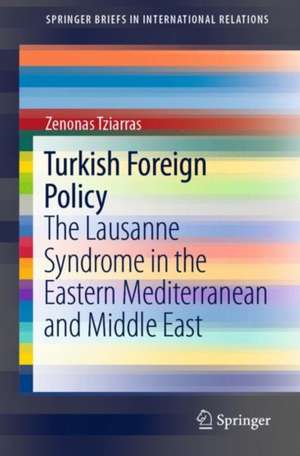Turkish Foreign Policy: The Lausanne Syndrome in the Eastern Mediterranean and Middle East: SpringerBriefs in International Relations
Autor Zenonas Tziarrasen Limba Engleză Paperback – 28 ian 2022
By employing a Neoclassical Realist theoretical framework and paying particular attention to ideational factors, the book argues that, contrary to the more widely known ‘Sèvres Syndrome’, which predicts a more cautious brand of Turkish foreign policy, the ‘Lausanne Syndrome’ is associated with a different political-ideological current and predicts a more revisionist type of foreign policy behaviour, even though it has emerged out of the same historical circumstances and been triggered by the same external geopolitical factors. The impact of the ‘Lausanne Syndrome’ on Turkey’s foreign policy behaviour is subsequently tested in four case studies from the Eastern Mediterranean and the Middle East: Cyprus, Libya, Syria, and Iraq.
Preț: 394.99 lei
Nou
Puncte Express: 592
Preț estimativ în valută:
75.59€ • 78.82$ • 62.82£
75.59€ • 78.82$ • 62.82£
Carte disponibilă
Livrare economică 27 februarie-13 martie
Livrare express 13-19 februarie pentru 23.42 lei
Preluare comenzi: 021 569.72.76
Specificații
ISBN-13: 9783030907457
ISBN-10: 3030907457
Pagini: 114
Ilustrații: VIII, 114 p. 2 illus.
Dimensiuni: 155 x 235 x 15 mm
Greutate: 0.19 kg
Ediția:1st ed. 2022
Editura: Springer International Publishing
Colecția Springer
Seria SpringerBriefs in International Relations
Locul publicării:Cham, Switzerland
ISBN-10: 3030907457
Pagini: 114
Ilustrații: VIII, 114 p. 2 illus.
Dimensiuni: 155 x 235 x 15 mm
Greutate: 0.19 kg
Ediția:1st ed. 2022
Editura: Springer International Publishing
Colecția Springer
Seria SpringerBriefs in International Relations
Locul publicării:Cham, Switzerland
Cuprins
Chapter 1: Introduction: Turkish Foreign Policy and the ‘Lausanne Syndrome.- Chapter 2: A Neoclassical Realist Framework.- Chapter 3: From the National Pact to the Sèvres and Lausanne: The Birth of Two Syndromes.- Chapter 4: Discursive Manifestations of the Lausanne Syndrome since the Second Group and the AKP’s Geopolitical Vision.- Chapter 5: The Lausanne Syndrome and Revisionism under the AKP: The Eastern Mediterranean and the Middle East.- Chapter 6: Conclusions.
Notă biografică
Zenonas Tziarras is a Researcher with the Peace Research Institute Oslo Cyprus Centre (PRIO Cyprus Centre). Holding a PhD in Politics and International Studies from the University of Warwick, UK, his main areas of research are Turkish foreign policy and the geopolitics of the Middle East and the Eastern Mediterranean.
Textul de pe ultima copertă
In the context of rapid developments in Turkey and its broader geopolitical environment over the past decade, this book examines and conceptualises Turkey’s changing foreign policy towards a more assertive and revisionist paradigm. More specifically it details the rhetorical and practical-political content of what is termed ‘Lausanne Syndrome’; namely, Turkey’s efforts in recent years – under the AKP government – to revise the geopolitical status quo brought about by the Treaty of Lausanne (1923) in its broader neighbourhood.
By employing a Neoclassical Realist theoretical framework and paying particular attention to ideational factors, the book argues that, contrary to the more widely known ‘Sèvres Syndrome’, which predicts a more cautious brand of Turkish foreign policy, the ‘Lausanne Syndrome’ is associated with a different political-ideological current and predicts a more revisionist type of foreign policy behaviour, even though it has emerged out of the same historical circumstances and been triggered by the same external geopolitical factors. The impact of the ‘Lausanne Syndrome’ on Turkey’s foreign policy behaviour is subsequently tested in four case studies from the Eastern Mediterranean and the Middle East: Cyprus, Libya, Syria, and Iraq.
By employing a Neoclassical Realist theoretical framework and paying particular attention to ideational factors, the book argues that, contrary to the more widely known ‘Sèvres Syndrome’, which predicts a more cautious brand of Turkish foreign policy, the ‘Lausanne Syndrome’ is associated with a different political-ideological current and predicts a more revisionist type of foreign policy behaviour, even though it has emerged out of the same historical circumstances and been triggered by the same external geopolitical factors. The impact of the ‘Lausanne Syndrome’ on Turkey’s foreign policy behaviour is subsequently tested in four case studies from the Eastern Mediterranean and the Middle East: Cyprus, Libya, Syria, and Iraq.
Caracteristici
Offers a novel Neoclassical Realist analysis of Turkish foreign policy Presents case studies from the Middle East and the Eastern Mediterranean Analyses Turkey’s efforts to revise the geopolitical status quo in its broader neighbourhood




